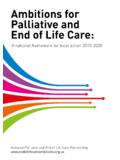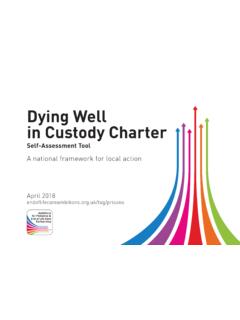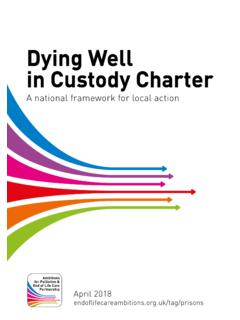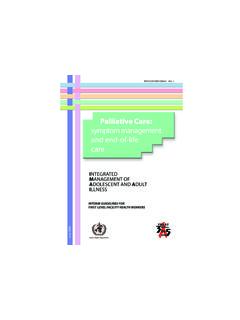Transcription of Ambitions for Palliative and End of Life Care
1 Ambitions for Palliative and End of life care :A national framework for local action 2015-2020 National Palliative and End of life care PartnershipNational Palliative and End of life care PartnershipAssociation for Palliative Medicine; Association of Ambulance Chief Executives; Association of Directors of Adult Social Services; Association of Palliative care Social Workers; care Quality Commission; College of Health care Chaplains; General Medical Council; Health Education England; Hospice UK; Macmillan Cancer Support; Marie Curie; Motor Neurone Disease Association; National Bereavement Alliance; National care Forum; National Council for Palliative care ; National Palliative care Nurse Consultants Group; National Voices; NHS England; NHS Improving Quality; Patients Association; Public Health England; Royal College of General Practitioners; Royal College of Nursing; Royal College of Physicians; Social care Institute for Excellence; Sue Ryder and Together for Short Live As organisations with experience of, and responsibility for, Palliative and end of life care we have made a collective decision to act together to do all we can to achieve for everyone what we would want for our own families.
2 Executive Summary: Ambitions for Palliative and End of life CareNational Palliative and End of life care Partnership The will, determination and innovation of organisations working collaboratively to find new ways of delivering better care will, and must, make a difference .The Foreword: Ambitions for Palliative and End of life CareNational Palliative and End of life care Partnership Palliative and End of life care Partnership We are sharing this framework for action with local leaders in every community whether they work in the statutory, private or voluntary sectors. We expect them to plan and act, using this framework, so that these Ambitions can be brought into reality. Introduction: Ambitions for Palliative and End of life care Palliative and end of life care must be at the heart of an integrated approach to care and support We want to work collectively to make the care that surrounds dying, death and bereavement as good as possible, for all We need to set our collective sights on these six Ambitions We ask you to designate a local lead, whether this is the Health and Wellbeing Board, Clinical Commissioning Group, or Local Authority, to lead and coordinate a process for working towards these Palliative and End of life care Partnership overarching vision I can make the last stage of my life as good as possible because everyone works together confidently.
3 Honestly and consistently to help me and the people who are important to me, including my carer(s). Every Moment Counts National Voices, National Council for Palliative care and NHS Palliative and End of life care Partnership person is seen as an individual01 Maximising comfort and wellbeing03 Each community is prepared to help06 All staff are prepared to care05 Each person gets fair access to care02 care is coordinated04 I can make the last stage of my life as good as possible because everyone works together confidently, honestly and consistently to help me and the people who are important to me, including my carer(s). Six Ambitions to bring that vision aboutNational Palliative and End of life care Partnership foundations for the ambitionsNational Palliative and End of life care Partnership care planningEducation and trainingEvidence and informationCo-designShared records24/7 accessInvolving, supporting and caring for those important to the dying personLeadershipPersonalised care planningEverybody approaching the end of their life should be offered the chance to create a personalised care plan.
4 Opportunities for informed discussion and planning should be universal. Such conversations must be ongoing with options regularly recordsTo ensure the plan can guide a person centred approach it has to be available to the person and, with their consent, be shared with all those who may be involved in their and informationComprehensive and robust data are necessary to measure the extent to which the outcomes that matter to the person are being achieved. This, alongside strengthening the evidence-base, will help to drive service , supporting and caring for those important to the dying personFamilies, friends, carers and those important to the dying person must be offered care and support. They may be an important part of the person s caring team, if they and the dying person wish them to be regarded in that way.
5 They are also individuals who are facing loss and grief for the ambitionsNational Palliative and End of life care Partnership for the ambitionsNational Palliative and End of life care Partnership and trainingIt is vital that every locality and every profession has a framework for their education, training and continuing professional development to achieve and maintain competence and allow expertise and professionalism to accessWhen we talk about end of life care we have to talk about access to 24/7 services as needed, as a matter of course. The distress of uncontrolled pain and symptoms cannot wait for opening hours .Co-designEnd of life care is best designed in collaboration with people who have personal and professional experience of care needs as people die.
6 LeadershipThe leadership of Health and Wellbeing Boards, CCGs and Local Authorities are needed to create the circumstances necessary for action. Clinical leadership must be at the heart of individual service person is seen as an individualI, and the people important to me, have opportunities to have honest, informed and timely conversations and to know that I might die soon. I am asked what matters most to me. Those who care for me know that and work with me to do what s Palliative and End of life care Partnership person is seen as an individualThe building blocks for achieving our ambition01 National Palliative and End of life care Partnership should have the opportunity for honest and well-informed conversations about dying, death and conversationsEffective systems need to reach people who are approaching the end of life , and ensure effective assessment, care coordination.
7 care planning and care for person centred carePeople should know what they are entitled to expect as they reach the end of their expectationsPeople must be supported with rapid access to needs-based social to social carePersonal budgets and integrated personalised commissioning are some of the potentially powerful tools for delivering tailored and personal care for many more people take controlEnd of life care is part of new models of integrated health and social care being promoted across the health and social care careCaring for the individual includes understanding the need to support their unique set of relationships with family, friends, carers, other loved ones and their community, including preparing for loss, grief and end of life care includes bereavementEach person gets fair access to careI live in a society where I get good end of life care regardless of who I am, where I live or the circumstances of my life .
8 National Palliative and End of life care Partnership person gets fair access to careThe building blocks for achieving our ambition02 National Palliative and End of life care Partnership end of life care organisations must use aggregate data to understand and remedy the partial reach of their existing dataLocal plans should include partnerships between different faith groups and cultural communities, as well as the diverse organisations that support children and young adults, people living with different life shortening illness, and those managing the difficulties of older partnershipsIndividual organisations and local systems of care should engage with initiatives to generate much more robust and useful statistical data. This can guide care , drive organisational strategies and inform local and national new dataTo achieve equity in access, provision and responsiveness requires unwavering commitment.
9 This should be backed up by local contracts that embed evidence-based measures of equity in commitmentLocally, Health and Wellbeing Boards should lead the development of population based needs assessment for end of life care services. Commissioners and providers need to use this to influence their organisation of care so that they can demonstrate increasingly equitable based needs assessmentThe comprehensive use of person centred outcome measures will enable services to be held to account. With independent analysis of a consistent data set, improvement can be tracked and regulatory actions taken to ensure all providers are enabling fair access to centred outcome measurementMaximising comfort and wellbeingMy care is regularly reviewed and every effort is made for me to have the support, care and treatment that might be needed to help me to be as comfortable and as free from distress as Palliative and End of life care Partnership comfort and wellbeingThe building blocks for achieving our ambition03 National Palliative and End of life care Partnership is important to recognise all sources of distress quickly, to acknowledge distress and to work with people to assess its extent.
10 Its cause and what might be distress whatever the causeThe experience of suffering associated with physical symptoms may be exacerbated, or sometimes caused, by emotional, or psychological anguish, or social or spiritual distress. Addressing this requires professionals to recognise, understand and work to alleviate the all forms of distressAttending to physical comfort, pain and symptom management is the primary obligation of clinicians at this time of a person s life and their skills and competence to do so must be assured and kept up to assessment & symptom managementPeople approaching the end of life should have access to Specialist Palliative care when this is needed. This should include a clear understanding of how to access medicines and equipment as part of the rapid response to changing Palliative carePeople approaching death should expect local systems to accord with the priorities identified by the Leadership Alliance for the care of Dying for care of the dying personMaximising the person s independence and social participation to the extent that they wish requires professionals to work with, and support, the person in helping them to achieve their personal Palliative careCare is coordinatedI get the right help at the right time from the right people.







